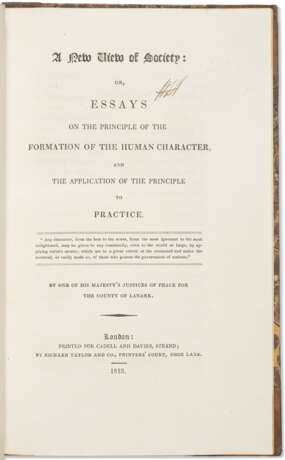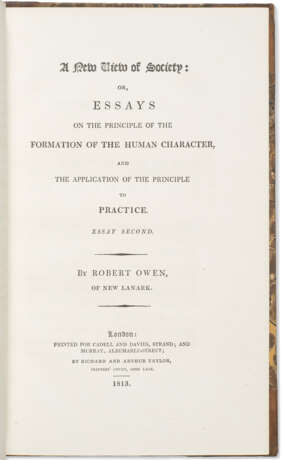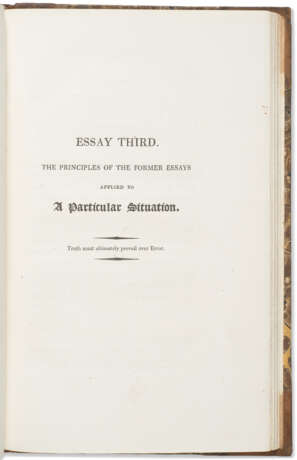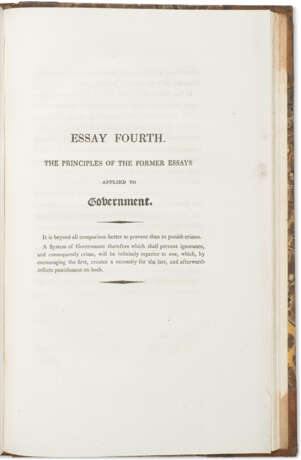ID 1360901
Lot 184 | A New View of Society
Valeur estimée
$ 25 000 – 35 000
"The Birth of Socialism"; first edition of this collection of four essays by one of Britain's foremost reformers, with contemporary Welsh provenance (PMM 271). The Welsh manufacturer-turned-reformer Robert Owen published his first treatise, a collection of four essays, to set out his early proposals for social reform, focused on education and labor. "Here, in what remains his best-known work, Owen demanded a system of national education to prevent idleness, poverty, and crime among the 'lower orders' (Selected Works, vol. 1), and recommended restricting 'gin shops and pot houses', the state lottery and gambling, as well as penal reform, ending the monopolistic position of the Church of England, and collecting statistics on the value and demand for labour throughout the country. Owen denied proposing 'that the British government should now give direct employment to all its working population'. Instead, education should lead the poor 'to find employment sufficient to support themselves, except in cases of great sudden depression in the demand for, and consequent depreciation in the value of, labour' (Selected Works, 1.97)" (ODNB).
"The theory of socialism has a long and distinguished history [...] Yet the first practical statement of socialist doctrine came not from a theorist but from one who based it on practical experiment. Robert Owen became the manager of a cotton mill at the age of nineteen. He was brilliantly successful, not merely as a manager, but as an innovator, introducing the first imported cotton from America and improving the quality of the yarn. Before he was thirty he already had the experience, and the confidence born of it, to undertake his great experiment". Buying an old factory with some of the worst working conditions in Britain, the New Lanark Mills, Owen improved the workers' housing, cost of basic goods and education. Though "'The Lanard Experiment' was a great success, and the mill ran a profit," Owen's partners were not convinced by the additional spending on social schemes and the partnership was dissolved. Owen founded a new company in which Jeremy Bentham was a partner (PMM).
"It was at this juncture that A New View of Society came out. In it Owen laid down the principles which had determined his experiment. Having no belief in any kind of religion, he had thought out a new system of beliefs for himself. The chief points were that man's character is made not by but for him and that it has been formed by circumstances over which he has no control. The prime necessity in the right formation of character is therefore to place him under proper physical, moral and social influences from the very beginning. These principles—the fundamental irresponsibility of man and the effect of good early influence—lie at the root of Owen's theories and his practice. New Lanark continued to show their efficacy, and it became a model community, much visited by the statesmen of Europe". Owen later dedicated himself to establishing a similar community at New Harmony, Indiana, though it was less successful, "but the vitality of the word 'socialism', first coined by Owen about 1835, is testimony to the enduring value of his work" (PMM).
This copy comes from the library of William Hughes, 1st Baron Dinorben. Lord Dinorben was a Welsh copper mine owner (Parys Mountain copper mine in Anglesey) and served as a Whig MP from 1802 to 1831. During Lord Dinorben's time in Parliament, Owen himself spoke in a House of Commons Committee on the State of Children Employed in Manufactories in 1816. Lord Dinorben is not listed as a participant in this committee, but perhaps it is what first alerted him to Owen's work, in addition to their mutual connection to Welsh industry (Parliamentary Papers: 1816, vol. 3). Lord Dinorben was indeed largely inactive as a parliamentarian, but steadily supported Whig reforms and towards the end of his career showed a strong interest in the Great Reform Act of 1832, which "contrasts strikingly with his previous idleness" (Fisher, History of Parliament: The House of Commons, 1820-1832 (2009)). Kress B.6194.
Four volumes in one, octavo (233 × 115mm). First and second essays with separate title-pages and separately paginated, third and fourth essay with half-titles and continuously paginated (occasional spotting and offsetting). Contemporary quarter calf, marbled paper (hinges worn). Provenance: William Lewis Hughes, 1st Baron Dinorben (1767–1852; bookplate, ownership inscription on title-page "WLH").
| Adresse de l'enchère |
CHRISTIE'S 20 Rockefeller Plaza 10020 New York Etats-Unis | ||||||||||||||
|---|---|---|---|---|---|---|---|---|---|---|---|---|---|---|---|
| Aperçu |
| ||||||||||||||
| Téléphone | +1 212 636 2000 | ||||||||||||||
| Fax | +1 212 636 4930 | ||||||||||||||
| Conditions d'utilisation | Conditions d'utilisation | ||||||||||||||
| transport |
Service postal Service de messagerie ramassage par vous-même | ||||||||||||||
| Modes de paiement |
Virement bancaire | ||||||||||||||
| Heures d'ouverture | Heures d'ouverture
|






